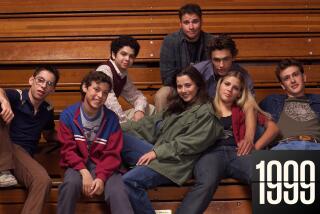RETURN OF THE FUGS, ‘60s SHOCK-ROCKERS
- Share via
HURLEY, N.Y. — A mile and a half down an unmarked dirt road about two hours’ drive north of New York City, a farmhouse and a dilapidated barn stand in an extensive cornfield adjacent to a narrow, winding creek.
Inside the farmhouse in this placid, pastoral setting is a compact, sophisticated recording studio where one of the most notorious underground bands of the late 1960s has reunited.
Yes, the Fugs are back.
The group, whose leader and founding member Ed Sanders has been called “the purple-haired godfather of punk,” is now two decades older than when the group unleashed shock-rock with songs like “Dirty Old Man” and “Kill for Peace.”
But judging from their 1986 “No More Slavery” album--the Fugs’ first studio effort since disbanding in 1969--and the group’s current “Star Peace” album, an ambitious two-record political rock opera, the Fugs have lost none of their anti-Establishment bent nor their savage wit. The band has mellowed only to the point that Sanders now stresses musicianship on stage over the attention-grabbing and occasionally obscene stunts that once were the Fugs’ trademarks.
“We can still put on a pretty good show for a bunch of burnt-out old guys,” Sanders, 47, said during an interview at the farmhouse--a.k.a. NRS Studio, which is owned by latter-day Fugs member Scott Petito.
NRS has served as the group’s headquarters since being resurrected in 1984. “The year of Orwell and Reagan--it seemed like a good time for the Fugs to get together again,” Sanders said. The studio is less than 10 miles from Sanders’ residence in the most famous ‘60s counterculture town of all: Woodstock.
In describing the three-act, 10-scene “Star Peace,” which lambastes the Reagan Administration, the Soviet Union, the Strategic Defense Initiative, science, technology and religious fundamentalists among other targets, Sanders said, “I view it as a morality play that looks at the question of how the human race will behave as it goes into space.
“It’s operatic in form, in that it has songs and regular recitative,” said Sanders, whose long brown hair and walrus-like mustache are streaked with gray but remain as untamed as ever. “But I’d rather call it musical drama or ‘Lassie Goes to Washington’--anything except opera. Opera is like poetry: Most people feel that it’s better to be tortured or submit to wholesale root canal work than sit through it.”
Had it not been for his own success writing and reading poetry, however, Sanders might have been forced to get a “real job” years ago. As it is, he’s been able to support himself through a combination of free-lance journalism assignments, poetry books and readings, fellowships and grants.
Still with Sanders in the group is fellow founding member and former Greenwich Village poet Tuli Kupferberg, who lives and works in New York City and whose age Sanders would only estimate as “ready for Medicare . . . he’s in his 60s.”
For the “Star Peace” project, Sanders and Kupferberg expanded the Fugs’ five-man lineup of recent years (including Petito, guitarist-keyboardist Steven Taylor and percussionist Coby Batty) with several formally trained singers to handle the various roles.
Notwithstanding the satire in the new “Technology Is Going to Set Us Free,” the Fugs have wholeheartedly embraced music’s technological advances of the past 20 years, including “synth sandwiches”--Petito’s description for the layers of synthesized sounds he has created on the album. In addition, both recent Fugs albums have been released on compact disc as well as LP and cassette formats.
“Star Peace” was premiered in 1986 in Syracuse and was performed again later last year, in a revised version, in Oslo. With the recording completed, Sanders said the Fugs are undertaking more live performances in New York and Europe.
Sanders is also still trying to set up the group’s first visit to Southern California in 18 years. “I’d like to play the Santa Monica Civic again, because we had some great shows there. I’d like to come out and do two nights--one for all the old stuff and one for ‘Star Peace.’ ”
Given the band’s former penchant for sexually explicit songs, it’s no surprise that the Fugs never came close to having a hit record. Only one Fugs album, the group’s 1966 debut, ever cracked Billboard’s Top 100.
Yet for all the Fugs’ connection to the history of American protest music, its recent records have been released by foreign record labels and been available in the United States only in import bins. That’s the case with “Star Peace,” which is on France’s New Rose label.
But that doesn’t bother Sanders. As much a business maverick as a refugee from social and political conventions, he is hesitant to realign himself with major record labels--not that any have been beating down his door to sign the Fugs.
Much of his griping about the commercial end of the music business stems from the Fugs’ experience with “record contracts that were worse than Leadbelly’s.” A Fugs compilation album was released in 1983, but Sanders said, “We’re the artists and we’re not getting any royalties. The issue is that artists should own their masters (tapes).”
Sanders has, however, come up with a solution he thinks will thrust the Fugs into the commercial mainstream: “We’re still going to do our socially conscious dance album.”
Even so, the Fugs remains “a hobby” more than a full-time career proposition for its members. After a couple of early-’70s solo albums, Sanders has made his living primarily as a writer--his Charles Manson chronicle, “The Family,” was a best-seller in 1971--and more recently he received a National Endowment for the Arts grant and a Guggenheim Foundation fellowship for poetry.
Kupferberg, in contrast, has maintained a lower profile since, as Sanders puts it, he “dropped out to be a house-husband for about 15 years. He’s raised some very nice kids.”
Still, the key question is whether in 1987 there is a place for a group as unashamedly topical as the Fugs and for a record as blatantly political as “Star Peace.”
Said Sanders: “There’s an Indian adage: ‘Tell a good story and the whole world will listen.’ I’m always an optimist. I think we’ve got a record that’s recorded well and sung well. I think we’re on the right track.”
More to Read
The biggest entertainment stories
Get our big stories about Hollywood, film, television, music, arts, culture and more right in your inbox as soon as they publish.
You may occasionally receive promotional content from the Los Angeles Times.









